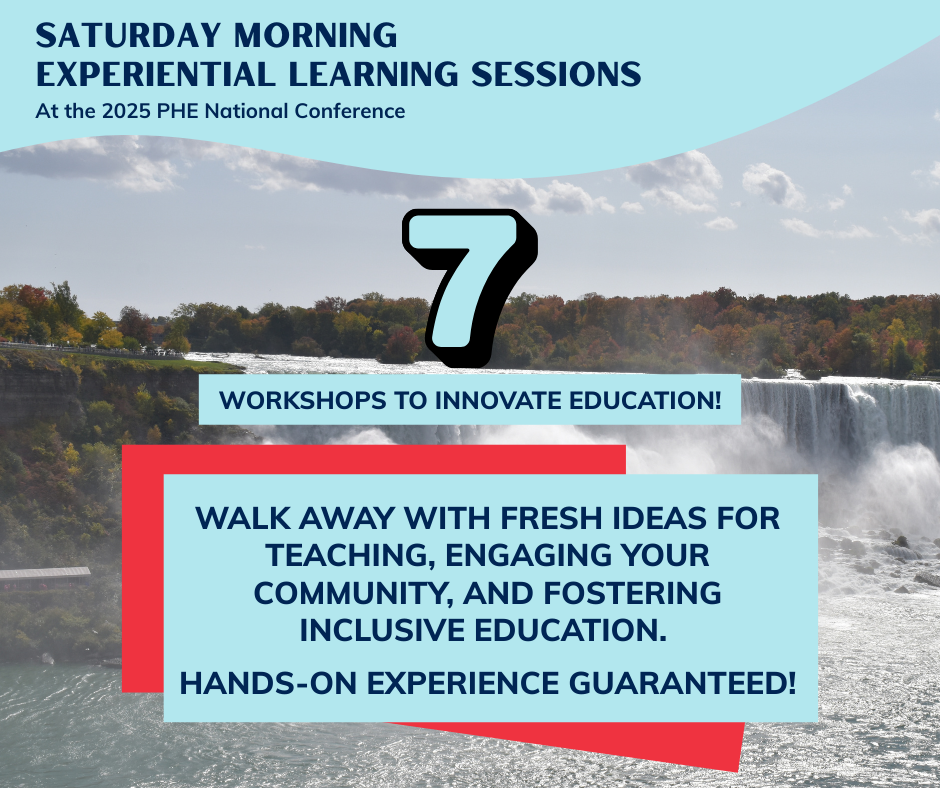
As part of the 2025 PHE National Conference, we are excited to offer seven Experiential Learning Sessions on Saturday morning. These immersive workshops are designed to showcase innovative approaches to teaching, deepen community engagement, and promote inclusive education.
Each session provides hands-on experiences and practical tools that participants can apply directly in their professional settings.
Hands in the Dirt, Feet on the Ground: A Shelter and Fire Building Workshop
Join a hands-on shelter and fire-building workshop at Walker Living Campus. Learn basic shelter construction principles (site selection, insulation) and ferro rod fire-starting techniques. Work in teams, develop problem-solving skills, and build confidence in outdoor education. No prior experience needed. Expect to handle natural materials and get dirty. This workshop offers practical learning strategies to inspire student curiosity and environmental connection.
Session Cap: 25
Embedded Curriculum and Station Based Pedagogy for Adaptive Physical Activity Experiences
Explore Brock University's Centre of Adaptive Physical Activity (C.A.P.A.) and learn Embedded Curriculum and Station Based Pedagogy (SBP). These approaches, based on fundamental movement skills and distributed practice, enable meaningful movement learning. Practice stability, locomotor, object manipulation, and gross and fine motor skills. Hands-on workshop to apply new approaches to your physical activity programming.
Session Cap: 30
Dreaming Alongside Black Youth Through Water
This arts-based session offers engagement with contemporary and archival images to explore a story-work collaging practice that supports dreaming alongside Black youth. Attendees will develop awareness that strengthens engagement between Black youth and educators in health and physical education spaces. We will explore ways to support Black students, develop awareness of the role water could play in their wellbeing, and explore the relationships to water from an Afrocentric lens. Participants will leave with an arts practice that they can use within and outside physical education spaces to further support their relationships with students.
No Session Cap
Coaching with the Brain in Mind: Trauma-Informed Strategies to Help Athletes Thrive
Great coaching goes beyond the game. It’s about creating environments where all kids, especially those who’ve faced trauma, feel safe, supported, and ready to grow. This session, inspired by the work of Dr. Bruce Perry, explores brain-based coaching strategies that use relationships, movement, and manageable stress to build resilience and confidence in athletes. Learn how trauma-informed coaching can transform the idea of school teams, keeping students who need sports most, engaged and thriving. Hear about how Jays Care Foundation’s Affiliate Schools Program is using these tactics with over 1,000 schools across Canada and how to bring these strategies to life in school communities. Walk away with practical tools to coach with the brain in mind and make a lasting impact on and off the field.
Session Cap: 100
HopOn – Play, Pedal and Learn
Teachers will learn how a HopOn session is delivered as part of a phys ed class at their school. This will be a fully active session with teachers on bikes going through the session outside, learning how to use the space provided, learning new skills, games, etc. This session will be outside in a parking lot or field and we will use the space provided to learn some new skills and play some fun games. If you are able to ride a bike you can actively participate in this session. All participants will need to wear a helmet and be dressed to be outdoors for all types of weather. Bikes and helmets will be provided to participants that need them.
Session Cap: 12
Introduction to Cricket
This session is designed for teachers interested in incorporating cricket into physical education classes. It will provide an understanding of the game, including its rules, laws, and basic technical concepts for batting, bowling, and fielding. Teachers will learn how to deliver cricket lessons through drills, activities, and modified games that are easy to implement. They will also gain the knowledge to educate and advise other teachers about cricket.
Session Cap: 25
Blanket Exercise and Why Settlers Need to Understand the Indian Act Now
Created in 1997 by Indigenous peoples and allies, the Blanket Exercise was intended to introduce Canadians and Indigenous peoples after findings from the Royal Commission on Aboriginal Peoples (RCAP 1996) and major historical events in Canadian history were written about in relation to settler-Indigenous relations and legislation. This popular cultural tool, later known as the Blanket Exercise, is built on relationships between Indigenous and non-Indigenous peoples to raise awareness of continuing injustices and impacts of colonization, and to promote further learning. The script has been updated numerous times by Indigenous peoples and allies to reflect current events, including most recently the final reports of the Truth and Reconciliation Commission of Canada (TRC) and the National Inquiry into Missing and Murdered Indigenous Women and Girls (MMIWG).
Participants will then look at the relationship between Indigenous peoples and settlers over the last 500 years and focuses on the history and philosophies which informed - and continue to inform - the Indian Act today. Participants will learn about the form of early treaties and key historical documents leading up to the Indian Act, that outline principles and values of relationships to each other and the environment. It was the Indian Act itself that marked a stark and insidious turning point in the history and future of this nation.
Participants can also expect to make connections between the impact of this colonial legislation and practice with current daily and systemic realities for all of us in this country. There will be a question and answer session, which will help participants understand how these institutions have impacted their lives – not just the lives of Indigenous peoples – and what some next steps might be.
Session Cap: 60
